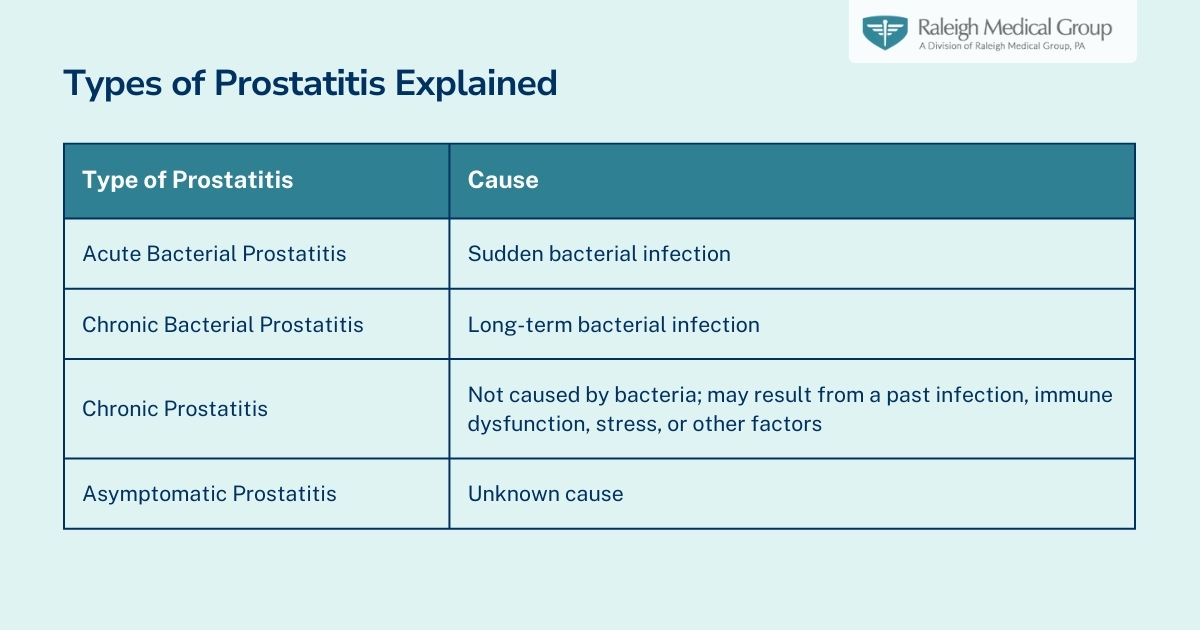Prostatitis vs Prostate Cancer: Our Focus on Men’s Health
Though prostate cancer receives most of the attention, a less serious prostate condition known as prostatitis is a common health issue affecting up to one in six men.
Both conditions affect your prostate gland, but what’s the difference between prostatitis vs prostate cancer? And when should you seek medical attention if you believe you may have prostatitis?
At Raleigh Medical Group, we’re dedicated to your overall wellness, and that includes providing extensive services related to men’s health. We can help treat and manage symptoms related to a variety of health conditions ranging from erectile dysfunction to low testosterone. Are you overdue for your annual prostate exam? Want to find solutions to “low T?” If so, we encourage you to contact us for an appointment.
In this article, we’ll talk about what prostatitis is and how it’s diagnosed, the difference between prostate cancer vs prostatitis, and review prostatitis symptoms and treatment options.
What is Prostatitis?
Prostatitis is an inflammation of the prostate gland, a walnut-sized organ located below the bladder in men. In some cases, prostatitis is caused by a bacterial infection, though sometimes the cause is unknown. While prostate cancer typically affects older men, prostatitis affects men across all age groups and is the most common urological condition in men younger than 50.
What Are The Different Types Of Prostatitis & Their Causes?
There are four types of prostatitis:
- Acute bacterial prostatitis
- Chronic bacterial prostatitis
- Chronic prostatitis
- Asymptomatic prostatitis

How is Prostatitis Diagnosed?
Your doctor will perform a physical exam, discuss your symptoms, and take your medical history. Diagnostic tests your doctor may order to identify prostatitis or other prostate problems include:
- Digital rectal exam (DRE)
- Blood test
- Urine test
- Transrectal ultrasound
Prostatitis vs Prostate Cancer: What’s the Difference?
Prostate cancer occurs when cells in the prostate replicate uncontrollably, forming a tumor. It is the most common cancer in men other than skin cancer. Prostatitis is an inflammation of the prostate gland and is usually not as serious. Both conditions may cause frequent or painful urination.
Risk factors for prostate cancer may include:
- Age: Two out of three prostate cancers are found in men over the age of 65.
- Race: African-American men are at greater risk of prostate cancer.
- Diet: Those with a diet high in red meat and high-fat dairy products may experience higher rates of prostate cancer.
- Family history: While those with a family history may be more likely to get diagnosed with prostate cancer, these are only a small number of cases.
Some risk factors for prostatitis may include:
- An enlarged prostate
- Diabetes
- Inflammation of your urethra
- History of sexually transmitted infections
If you have diabetes, Raleigh Medical Group is well-known for our experience and expertise in helping those with diabetes maintain optimal health. By helping you control your blood sugar, we can work together to reduce one of the risk factors associated with prostatitis.
Symptoms of Prostatitis
Symptoms of prostatitis may include:
- Pain when urinating or difficulty urinating
- Frequent urination
- Blood in urine or semen
- Pain in the back or abdomen
- Pain in the scrotum, penis or testicles
- Painful orgasms
- Flu-like symptoms such as fever, chills and muscle aches
How is Prostatitis Treated?
Treatment depends on the type of prostatitis you’re experiencing and may include antibiotics, alpha blockers or pain relievers.
- Acute bacterial prostatitis may be treated by a short course of antibiotics.
- Chronic bacterial prostatitis may be treated by a longer course of antibiotics.
- Chronic prostatitis, which isn’t caused by a bacterial infection, may be treated with physical therapy, relaxation exercises, or biofeedback.
- Asymptomatic prostatitis, for which there are no symptoms, doesn’t receive treatment.
Your doctor can talk to you about the most effective treatment for prostatitis based on your symptoms.
Raleigh Medical Group: Your Partner in Prostate Health
Prostatitis can affect men at any age. Since there are several types of prostatitis, understanding the condition – and the best treatment option – can be confusing. That’s why it’s best to take a proactive approach by talking to your doctor about this common condition if you think you may have it.
If you have any concerns about your prostate health, we invite you to schedule an appointment with our internal medicine physicians in Raleigh. We’ll help you understand any symptoms you may be experiencing, and work with you to formulate an effective treatment plan.
The content within this article and others on this website is only for educational purposes and should not be considered as medical advice. For any questions or concerns, please consult with your healthcare provider.
====
Sources:
Harvard Health, “Prostatitis: Inflamed Prostate Can Be a Vexing Health Problem,”
Healthline, “Prostatitis vs Prostate Cancer,” https://www.healthline.com/health/prostatitis-vs-prostate-cancer




